

Questions and answers about academic publishing – Jørgen Carling. IMISCOE Conference, Erasmus University Rotterdam 2017 In June 2017 I was invited to give a workshop on academic publishing for the IMISCOE PhD network, together with Sawitri Saharso, editor-in-chief of Comparative Migration Studies.
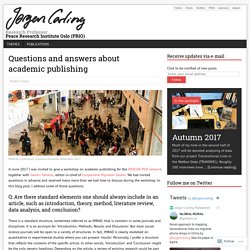
We had invited questions in advance and received many more than we had time to discuss during the workshop. In this blog post, I address some of those questions. Q: Are there standard elements one should always include in an article, such as introduction, theory, method, literature review, data analysis, and conclusion? Like Water for Horses; or, Why even good students don’t do multiple drafts. You can bring a horse to water, but you can’t make it drink.
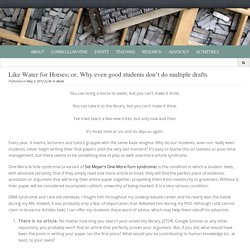
You can take it to the library, but you can’t make it think. I’ve tried teach a few new tricks, but only now and then It’s finals time at uni and its deja vu again. Every year, it seems, lecturers and tutors grapple with the same basic enigma: Why do our students, even our really keen students, never begin writing their final papers until the very last moment?
Writing the introduction to a journal article: Say what the reader is going to encounter and why it is important. An introduction has a lot of work to do in few words.
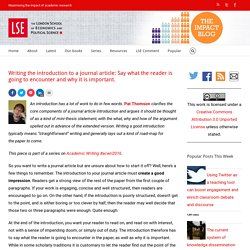
Pat Thomson clarifies the core components of a journal article introduction and argues it should be thought of as a kind of mini-thesis statement, with the what, why and how of the argument spelled out in advance of the extended version. Writing a good introduction typically means “straightforward” writing and generally lays out a kind of road-map for the paper to come. This piece is part of a series on Academic Writing #acwri2016. So you want to write a journal article but are unsure about how to start it off? Advice for graduate students having difficulty finishing their dissertations (essay) Dear Kerry Ann, I was hoping to finish my dissertation last year and graduate in May.
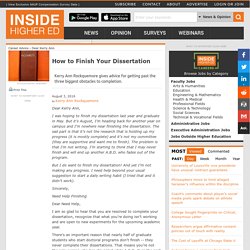
But it’s August, I’m heading back for another year on campus and I’m nowhere near finishing the dissertation. The sad part is that it’s not the research that is holding up my progress (it is mostly complete) and it’s not my committee (they are supportive and want me to finish). What’s in a name? The title of a journal article is the first thing the reader sees, so it’s important that it gives the reader a clear sense of what is coming.
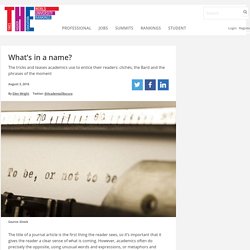
However, academics often do precisely the opposite, using unusual words and expressions, or metaphors and questions, in a seemingly deliberate attempt to obfuscate the contents. The titles that most irk me are those that awkwardly use tired clichés in an attempt to liven up the subject matter and entice the reader. In his excellent paper on the subject, “Familiarity breeds: clichés in article titles”, Neville Goodman notes how clichés that begin in business schools slowly seep into politics, and eventually into the argot of lawyers, doctors and academics. The Researching Librarian: Online Journals. "Information Technology and Libraries publishes material related to all aspects of libraries and information technology, including digital libraries, metadata, authorization and authentication, electronic journals and electronic publishing, telecommunications, distributed systems and networks, computer security and intellectual property rights, technical standards, geographic information systems, desktop applications, online catalogs and bibliographic systems, optical information systems, software engineering, universal access to technology, futuristic forecasting, library consortia, vendor relations, and technology and the arts....
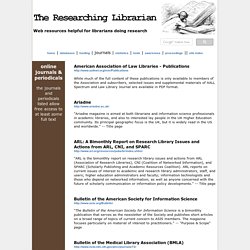
With volume 15, no. 4, the full text of some articles and columns are included. " -- Title page Information Today "Information Today delivers total coverage of late-breaking news and long-term trends in the information industry. Stop. Using. Periods. Period. Washington Post illustration; iStockphoto Have you ever watched parents try to text with their children?
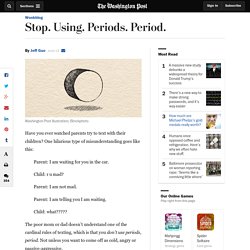
One hilarious type of misunderstanding goes like this: Parent: I am waiting for you in the car. Child: r u mad? Why do academics choose useless titles for articles and chapters? Four steps to getting a better title. An informative title for an article or chapter maximizes the likelihood that your audience correctly remembers enough about your arguments to re-discover what they are looking for.
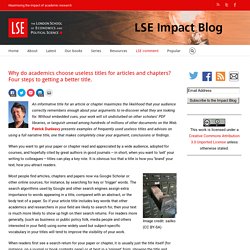
Without embedded cues, your work will sit undisturbed on other scholars’ PDF libraries, or languish unread among hundreds of millions of other documents on the Web. Patrick Dunleavy presents examples of frequently used useless titles and advises on using a full narrative title, one that makes completely clear your argument, conclusions or findings. When you want to get your paper or chapter read and appreciated by a wide audience, adopted for courses, and hopefully cited by great authors in good journals — in short, when you want to ‘sell’ your writing to colleagues — titles can play a key role. It is obvious too that a title is how you ‘brand’ your text, how you attract readers. Tackling a messy first draft. You may have just produced a great wadge of material through free writing.
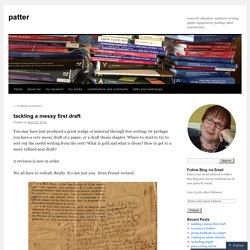
Or perhaps you have a very messy draft of a paper, or a draft thesis chapter. Where to start to try to sort out the useful writing from the rest? What is gold and what is dross? Title.php?id=300709# Emerging Strategies for Supporting Student Learning provides a straightforward and accessible guide to the latest learning and teaching practices appropriate for use with higher education students.
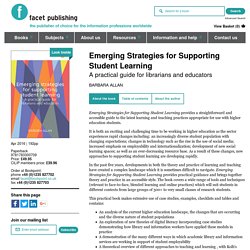
It is both an exciting and challenging time to be working in higher education as the sector experiences rapid changes including: an increasingly diverse student population with changing expectations; changes in technology such as the rise in the use of social media; increased emphasis on employability and internationalization; development of new social learning spaces; as well as an ever-decreasing resource base. As a result of these changes, new approaches to supporting student learning are developing rapidly. In the past five years, developments in both the theory and practice of learning and teaching have created a complex landscape which it is sometimes difficult to navigate. This practical book makes extensive use of case studies, examples, checklists and tables and contains: 1. Poor writing advice. There is some very poor academic writing advice out there in the ether.
And crappy academic writing advice drives me crackers. So, a health warning, this post is a bit of a rant. What’s the secret of good writing? I first encountered Robert Boice’s name about three years ago, somewhere online; after that, it started popping up every other month. Boice, I learned, was a US psychologist who’d cracked the secret of how to write painlessly and productively. Years ago, he’d recorded this wisdom in a book, now out of print, which a handful of fans discussed in reverent tones, but with a title that seemed like a deliberate bid for obscurity: How Writers Journey To Comfort And Fluency. Also, it was absurdly expensive: used copies sold for £130. Still, I’m a sucker for writing advice, especially when so closely guarded. So this month, I succumbed: I found a copy at the saner (if still eye-watering) price of £68, and a plain green print-on-demand hardback arrived in the post.
Science in Ten Hundred Words: The `Up-Goer Five' challenge. A central question of communicating science to a wider audience often boils down to this: can you take a complex scientific topic and explain it in a way that someone unfamiliar with the field can understand? The commonly-cited techniques for meeting this challenge, such as cutting out jargon and using relatable analogies, sound easy in principle but are often quite tough in practice. Perhaps that is why the Up-Goer Five text editor, created by geneticist Theo Sanderson, has struck such a cord with many scientists, including me and my co-blogger Anne Jefferson. Innovative Libraries, Contact me by email andywalsh@innovativelibraries.org.uk or on Twitter @andywalsh999. All our books will be available to buy worldwide from a range of sources. They can be ordered direct from normal library suppliers such as Bertram books, from Amazon, or direct from this site. For now, we only have a few books in Press,but as books are published, direct links to purchase will appear on this page.
Books through this page will include a discount, so will normally be the cheapest place to buy directly.